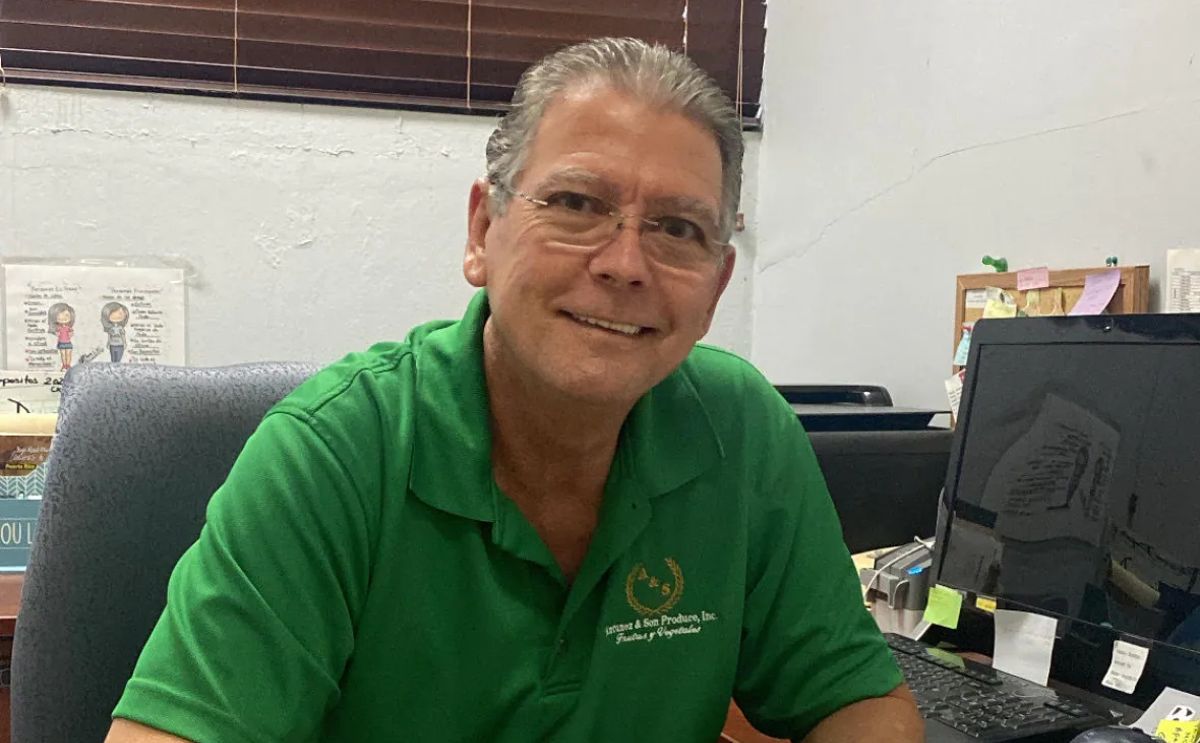Mark Antunez says some grocery store shelves are now empty where P.E.I. potatoes usually would be. Courtesy: Mark Antunez
Puerto Rico supermarket shelves empty as P.E.I. potato supply dries up

Potato importers in Puerto Rico say they are not able to fill their orders to supermarkets on the Caribbean island because they can't get enough supply to fill the void created by the export ban on P.E.I. potatoes. More than 80 percent of Puerto Rico's potatoes would usually come from Prince Edward Island.
Mark Antunez, the President of Antunez & Son Produce:
"We are in a bad, bad situation right now. We are the ones who supply the stores. There are about five or six big companies in Puerto Rico who supply the market, and there are no potatoes in the market."Mark Antunez has been importing potatoes from P.E.I. since 1988. He said his potato cooler is now filled with other vegetables, as he searches for more potatoes.
Mark Antunez:
"For example, normally I bought three or four containers a week from Prince Edward Island. Last week we ordered three loads and they guarantee just one. That's what I got in inventory, less what we already supplied our customers, and they do not have supply in the stores either. We are in a bad, bad situation right now."Antunez said he had been receiving potatoes from New Brunswick, but they are not able to fill his request for three containers, sending him just one.
Mark Antunez:
"We started being supplied from New Brunswick because, in the United States, there are not plenty of potatoes to supply the States, plus the island of Puerto Rico. But the New Brunswick company, probably they have their regular customers, plus on top of that add more customers like the U.S., plus Puerto Rico. It's not easy for them."

Antunez says his potato cooler is now filled with other vegetables, as he searches for more potatoes. Courtesy: Mark Antunez
Antunez said there have also been delays when the shipments do arrive because of extra scrutiny from border authorities, including the USDA.
Mark Antunez:
"They put all the containers in hold for inspection. And sometimes it takes one or two days after we receive the containers in our warehouse until they came to verify that the merchandise is not from P.E.I.."
"So it takes longer from the day that I received to supply my customers, to delivering the merchandise to my customers because of that — because of the inspections."

Antunez says his company has been buying potatoes from P.E.I. since they started the company in 1988. Courtesy: Mark Antunez
Antunez said he is now rationing the potatoes he is able to import to Puerto Rico, meaning none of his customers are receiving their full orders.Mark Antunez:
"I have to split the one container that I receive, and normally I move three containers. So in order to make 10, 15, 20 bags of potatoes, I can supply you just with three or four or five because I have just one container for all my customers."

The P.E.I. Potato Board says the Island ships between USD 18 and USD 20 million of potatoes to Puerto Rico. Courtesy: Caribbean Produce
Mark Antunez:
"We in Puerto Rico, 3.2 million is our population and probably 55-60 percent of them use the help from the food stamps, from the government. We are talking about hundreds of containers of P.E.I. potatoes that are not coming right now."Antunez also pointed out the U.S. territory does not grow potatoes so there is no threat to local agriculture from the potato wart fungus, which he said is yet another reason to reopen the border to potatoes from P.E.I.
"Potatoes are a cheap item that we can supply, because a five-pound bag of potatoes, you can buy for USD 2 or 3. That's a good item to feed the people of Puerto Rico. We need potatoes."
New Brunswick doing us a favour'
Edwin Vasquez at Raul Rosa Distributors said he is also struggling to get enough potatoes to Puerto Rico.
Edwin Vasquez:
"We bring four to five containers each month just for four supermarkets, and we have more than 200 supermarkets on the island. Just last night I was at a supermarket and the shelf with the potatoes has nothing in there."

A truckload of potatoes in Puerto Rico. More than 80 per cent of Puerto Rico's potatoes usually come from P.E.I..Courtesy: Joe Colon Studio
Edwin Vasquez:
"Over the next month, I think I got one, maybe two containers from New Brunswick. As far as I know, New Brunswick would have markets in the U.S. So basically they are doing us a favor to sell potatoes to Puerto Rico right now."

Tropical Shipping has a weekly sailing from the port of Halifax to Puerto Rico. This is the Canadian vessel arriving at the port of San Juan. Courtesy: Tropical Shipping
Edwin Vasquez:
"As soon as the container arrives, you have to make an FDA inspection. A container that usually takes one to three days to take out of the pier right now has to go to the inspection warehouse. And it takes about five, seven, even 10 days to take the container to our warehouses."

In 2020, sales to Puerto Rico accounted for about 25 percent of P.E.I.'s sales to the United States. Courtesy: Joe Colon Studio
Vasquez said those increased costs will also be added to the price of potatoes when they get to the supermarket.






